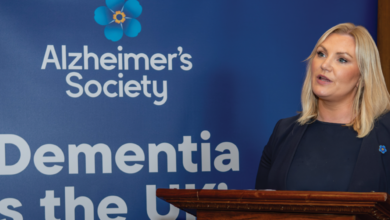Domiciliary review: Rapid Learning Review

In November 2020, Health Minister Robin Swann announced the conclusion of the Rapid Learning Review of Domiciliary Care in Northern Ireland. The final report made nine recommendations and will inform surge plans for the sector.
Domiciliary care is the range of services that can support individuals within the home. These services can include support with personal care, eating and drinking and household management. These homecare services are delivered through both the statutory and independent sectors and there are around 33,000 registered social care workers providing services in Northern Ireland, 45 per cent of whom work in domiciliary care. In total, around 270,000 people receive homecare from 18,000 domiciliary care staff (16,206 registered domiciliary care workers, 531 registered domiciliary care managers, 2,073 registered support workers and 120, domiciliary care providers) each week across Northern Ireland.
The Department of Health’s current definition notes: “It [domicillary care] is the range of services put in place to support an individual in their own home. Services may involve routine household tasks within or outside the home, personal care of the client and other associated domestic services necessary to maintain an individual in an acceptable level of health, hygiene, dignity, safety and ease in their home.”
Domiciliary care as a concept has expanded to incorporate “increasingly complex tasks”. These include the administration of medicine; supporting people with advanced dementia; stoma and catheter care; supporting people with dysphagia; and end of life care.
Described as an “essential frontline service” and a “core community service”, domiciliary care has been maintained throughout the Covid-19 pandemic with difficulty. It facilitates timely discharges from secondary care, enabling greater efficiency in the health and care system.
The Domiciliary Care Rapid Learning Review published in October 2020 was primarily focused on the response to Covid-19 while simultaneously highlighting pre-existing systemic challenges. The final report is intended to inform surge plans for the domiciliary care sector and any progress on measurable recommendations is to be monitored by the Adult Social Care surge working group.
Speaking about the Review, Minister for Health Robin Swann MLA said: “My Department has undertaken a Rapid Learning Review looking at the experience of domiciliary care during the pandemic. The Review engaged with a wide range of stakeholders including service users, carers, providers and commissioners.”
The Review comprises four themes.
- Service user and carer experience.
- Workforce.
- Service provision and business continuity.
- Infection prevention and control.
In the foreword to the final report, Chief Social Work Officer Seán Holland concedes: “We didn’t get everything right and there are many lessons to be learned,” adding: “I am very conscious that the value of the service provided in domiciliary care is not always reflected in the pay, terms and conditions of the workforce. The lessons from this review on these issues will be included in the Reform of Adult Social Care process which continues alongside the pandemic response.”
Overall, the Review collated “any learning about domiciliary care issues” throughout the Covid-19 pandemic to then inform the ongoing response and future planning. While acknowledging that several areas of the current domiciliary care sector require reform, the Review is primarily concentrated on Covid-related lessons. Broader learning in relation to longer-term challenges has been passed onto the Department’s Reform of Adult Social Care (RASC) team.
In total, the Review made nine overall recommendations containing dozens of action.
1. Improve recognition and profile of the domiciliary care workforce:
- Domiciliary care staff member attendance at ministerial briefings.
- A letter from Seán Holland specifically directed at domiciliary care staff.
- Domiciliary care providers “to consider sending” letters of gratitude to domiciliary care staff.
- Promotion of positive media stories relating to domiciliary care.
2. Improve recognition and support for family carers:
- An open letter of appreciation to family carers from the Health Minister.
- HSC trusts proactivity in offering carers’ grants and flexibility in their use to relieve stress for informal carers.
- HSC trusts proactivity in offering direct payments to family carers both for service user care and as a response to a specific carer need.
- The prioritisation of carers’ assessments and reassessments to be included in HSC trusts plans to mitigate against fatigues and adverse impact on wellbeing.
- Identification of new carers and referral into carer support services as required.
- Promotion of the inclusion of service users and family carers in pandemic planning.
3. Workforce support:
- Use of the Covid Staff Wellbeing Framework by providers to support staff.
- Increased awareness of access to psychological support for staff.
- Promotion of the NISCC online resource for staff wellbeing.
- Delivery of information on bereavement to domiciliary care staff.
- Opportunities for social interaction on virtual platforms.
- Provision of additional uniforms free of charge.
- Recognition of a predominantly female workforce.
- Recognition of potential for financial difficulties among the domiciliary care workforce.
- “Explore the provision” of mobile devices during the pandemic.
- Conduct a workforce survey in three months’ time.
- Development of a proposal for improvement of the lowest pay for social care staff in the independent sector.
- Development of proposals for standardised enhancement of training, development and career pathways.
4. Infection prevention and control (IPC):
- Review and consolidation of relevant IPC and PPE guidance to ensure regional consistency.
- Clear and consistent interpretation of IPC advice in domiciliary care settings.
- Regionally consistent, Covid-specific and current IPC training.
- Implementation of clear communication pathways for IPC guidance.
- Review of the optimal deployment of PPE supply points.
- Encouragement of strategies to encourage the optimal use of PPE.
- Monitoring of IPC training uptake by providers.
- Ensuring prompt access to testing and test results for domiciliary care staff.
5. Meeting need of service users and family carers:
- Proactive engagement with “all those whose domiciliary care packages have been stood down since the start of the pandemic”.
- Informing all service users and carers who had services stood down or reduced how they can contact their relevant HSC trust.
- Proactive engagement with people on HSC trust caseloads who may not have previously received a domiciliary care service but may now have additional need as a result of the pandemic.
- Proactive engagement with GPs, media outlets and community groups to publicise access pathways for support.
- Production of tailored Covid-related guidance for domiciliary care service users and family carers.
6. Financial support for providers:
- Establishing mechanisms for continued review of additional Covid-related costs.
- Collation of financial support available for providers in one document accompanied by regionally consistent pathways for claiming supports.
7. Communication with providers:
- Making all guidance, policy and procedure information for domiciliary care electronically available on one platform.
- Conveying new guidance to providers in advance and highlighting revised guidance.
- Delivering clear and concise guidance with actionable points.
- Providing regionally consistent guidance.
- Producing specific supported living guidance.
8. Data:
- Agreeing a core data set for domiciliary care during the pandemic across HSC trusts and regional agencies.
9. Systemic issues and future planning for domiciliary care:
- Home and the provision of adequate care in a home setting.
- Pay, terms and conditions improvements for the domiciliary workforce.
- The future model of social care provision, including the roles of statutory, private and voluntary sectors.
- Supports needs of carers.
- Including cost and benefit analysis of informal care in future service planning.
- Resourcing adequate data systems.
- Collection, analysis and application of data in domiciliary care.
- Meeting complex care needs.
- Support inclusion of service users and carers in planning and policy decisions.
- Obtaining evidence on demographics demands for forecasting and future planning.
- Reviewing and update the definition of domiciliary care.
Following the Review, Minister Swann announced a £5 million funding package for domiciliary care.
Speaking in November 2020, the Health Minister stated: “I am determined to drive forward reform across adult social care, including homecare. This will be ever more important as the elderly population continues to grow and as enhancements in technology and new models of care mean more and more people can be supported in their own homes.”





